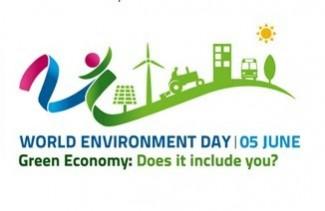Global warming has become a huge challenge to the world. Days are getting hotter and natural calamities are occurring more often. And on Tuesday, humanity observes World Environment Day (WED) with the theme 'Green Economy: Does it include you?'
India observes World Environment Day amidst hot summer.

Addressing the gathering at Science Express - Biodiversity Special train at Safdarjang Railway Station, New Delhi, Smt. Jayanthi Natarajan, Hon'ble Minister of State for Environment & Forests, spoke about the importance of environment.
"The World Environment Day is celebrated every year, to not only create awareness but also to reaffirm our commitment to protect and safeguard the environment for us and our future generations. It's a call for a positive environmental action to save our planet from further degradation," said Natarajan.
"India is blessed with rich natural resources, from the mighty Himalayas to the Gangetic plains to the Deccan; from the deserts to the lush greens in the North east; the Western Ghats, the coasts and the islands. No wonder our country is one of the 12 mega-diverse countries in the world, rich in biodiversity and associated traditional knowledge. It is not just about the tigers and the elephants, but it is also about the algae and the fungi, and the microbes that build up our systems. This biodiversity can only be protected for future use through informed and responsible decision making and by sustainable use by the communities. This requires understanding the value of the ecosystems to the benefit of the communities. Being aware of the biodiversity is the key to protecting the fragile ecosystem and threatened species," she added.
What is Green Economy?
The 2012 theme for World Environment Day is Green Economy: Does it include you?
The UN Environment Programme defines the Green Economy as one that results in improved human well-being and social equity, while significantly reducing environmental risks and ecological scarcities. In its simplest expression, a green economy can be thought of as one which is low carbon, resource efficient and socially inclusive.
Practically speaking, a Green Economy is one whose growth in income and employment is driven by public and private investments that reduce carbon emissions and pollution, enhance energy and resource efficiency, and prevent the loss of biodiversity and ecosystem services. These investments need to be catalyzed and supported by targeted public expenditure, policy reforms and regulation changes.













!['It's not Mumbai traffic, it's air traffic': Suriya apologises to Mumbai media after paparazzi yelled At Him for making them wait for hours [Watch]](https://data1.ibtimes.co.in/en/full/806234/its-not-mumbai-traffic-its-air-traffic-suriya-apologises-mumbai-media-after-paparazzi.jpg?w=220&h=138)



